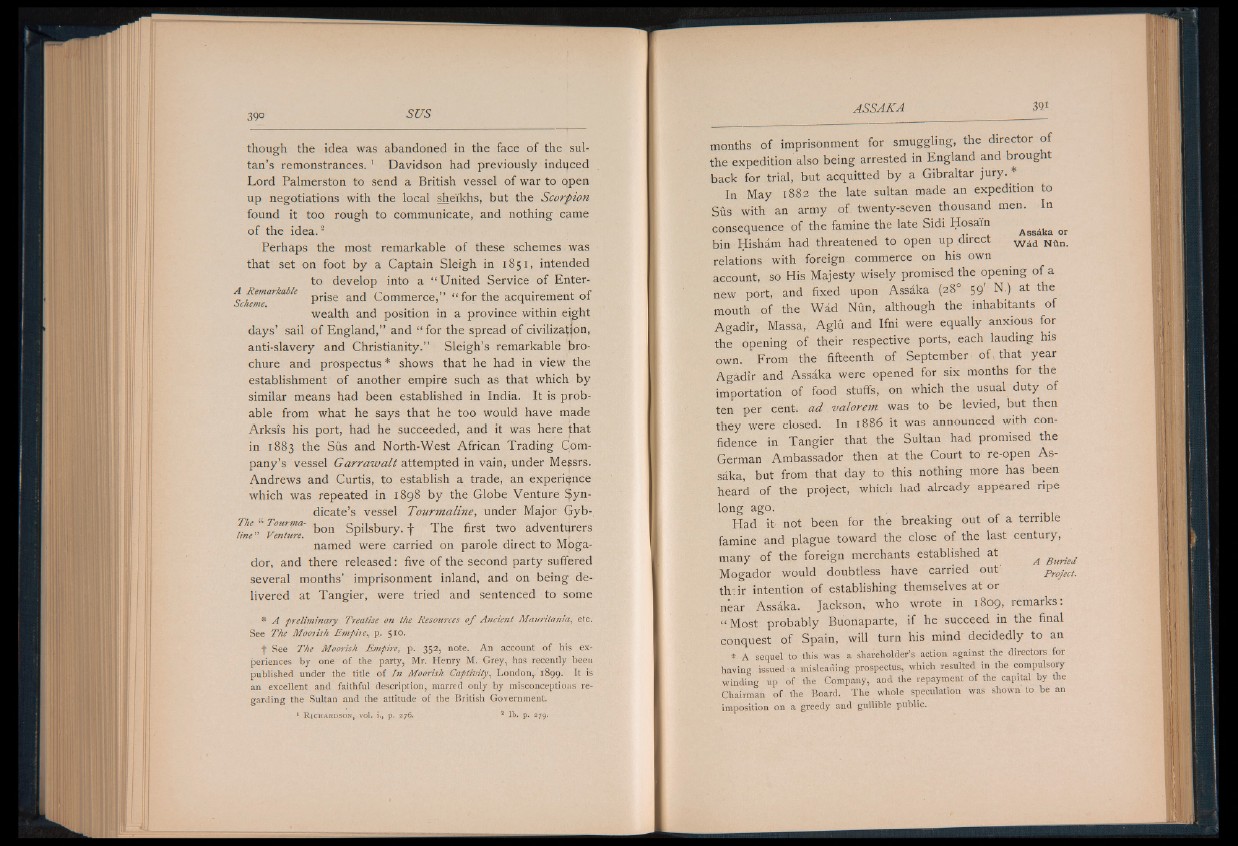
though the idea was abandoned in the face of the sultan’s
remonstrances.1 Davidson had previously induced
Lord Palmerston to send a British vessel of war to qpen
up negotiations with the local sheikhs, but the Scorpion
found it too rough to communicate, and nothing came
o f the idea.2
Perhaps the most remarkable o f these schemes was
that set on foot by a Captain Sleigh in 1851, intended
to develop into a “ United Service of Enter-
ASchemeirkable Pr*se anc^ Commerce,” “ for the acquirement of
wealth and position in a province within eight
days’ sail of England,” and “ for the spread of civilization,
anti-slavery and Christianity.” Sleigh’s remarkable brochure
and prospectus * shows that he had in view the
establishment of another empire such as that which by
similar means had been established in India. It is probable
from what he says that he too would have made
Arksis his port, had he succeeded, and it was here that
in 1883 the Sus and North-West African Trading Company’s
vessel Garrawalt attempted in vain, under Messrs.
Andrews and Curtis, to establish a trade, an experience
which was repeated in 1898 by the Globe Venture Syndicate’s
vessel Tourmaline, under Major Gyb-
Tfie Tourma- Spilsbury. f The first two adventurers
line Venture. 1 J t , .
named were carried on parole direct to Mogador,
and there released: five of the second party suffered
several months’ imprisonment inland, and on being delivered
at Tangier, were tried and sentenced to some
* A preliminary Treatise on the Resources o f Ancient Mauritania, etc.
See The Mooiish Empiiey p.. 5IO>
f See The Moorish Empire£ p. 352, note. An account of his experiences
by one of the party, Mr. Henry M. Grey, has recently been
published under the title of In Moorish Captivity, London,. 1899. It is
an excellent and faithful description, marred only by misconceptions regarding
the Sultan and the attitude of the British Government.
1 R i c h a r d s o n , v o l. i., p . 276. 2 lb . p. 279.
months of imprisonment for smuggling, the director of
the expedition also being arrested in England and brought
back for trial, but acquitted by a Gibraltar jury. *
In May 1882 the late sultan made an expedition to
Sus with an army of twenty-seven thousand men. In
consequence of the famine the late Sidi Hosain Assiika or
bin Hisham had threatened to open up direct Wdd Nfln
relations with foreign commerce on his own
account, so His Majesty wisely promised the opening of a
new port, and fixed upon Assaka (28° 59 N.) at the
mouth of the Wad Nun, although the inhabitants of
Agadir, Massa, Aglu and Ifni were equally anxious for
the opening of their respective ports, each lauding his
own. From the fifteenth of September o f , that year
Agadir and Assaka were opened for six months for the
importation of food stuffs, on which the usual duty of
ten per cent, ad valorem was to be levied, but then
they were closed. In 1886 it was announced with confidence
in Tangier that the Sultan had promised the
German Ambassador then at the Court to re-open A s saka,
but from that day to this nothing more has been
heard of the project, which had already appeared ripe
long ago.
Had it not been for the breaking out of a terrible
famine and plague toward the close of the last century,
many of the foreign merchants established at ^ Bnmd>
Mogador would doubtless have carried out' Project.
th:ir intention of establishing themselves at or
near Assaka. Jackson, who wrote in 1809, remarks:
“ Most probably Buonaparte, if he succeed in the final
conquest of Spain, will turn his mind decidedly to an
* A sequel to this was a shareholder’s action against the directors for
having issued ■ a misleading prospectus, which resulted in the compulsory
winding up of the Company, and the repayment of the capital by the
Chairman of the Board. The whole speculation was shown to be an
imposition on a greedy and gullible public.